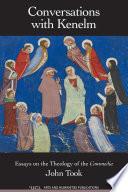
Cerca negli ebook:

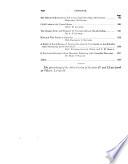
Transactions of the Fifteenth International Congress on Hygiene and Demography, Washington, September 23-28, 1912
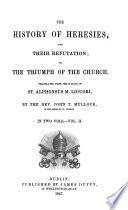
The History of Heresies, and Their Refutation
Autore: Saint Alfonso Maria de' Liguori
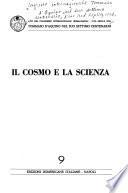
Atti Del Congresso Internazionale (Roma-Napoli, 17-24 Aprile 1974) Tommaso D'Aquino Nel Suo Settimo Centenario: Il cosmo e la scienza
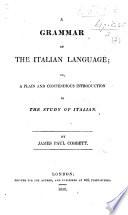
A Grammar of the Italian Language, etc
Autore: James Paul COBBETT
Numero di pagine: 392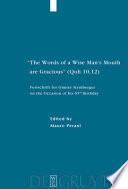
"The words of a wise man's mouth are gracious" (Qoh 10,12)
Autore: Mauro Perani
Numero di pagine: 503After World War II, Ernst Ludwig Ehrlich (1921-2007) published works in English and German by eminent Israeli scholars, in this way introducing them to a wider audience in Europe and North America. The series he founded for that purpose, Studia Judaica, continues to offer a platform for scholarly studies and editions that cover all eras in the history of the Jewish religion.
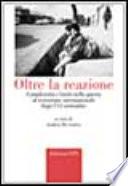
Oltre la reazione
Autore: Andrea De Guttry , Scuola superiore di studi universitari e di perfezionamento Sant'Anna di Pisa (Italy)
Numero di pagine: 393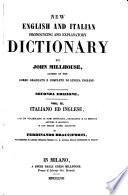
Italiano ed inglese
Autore: John Millhouse
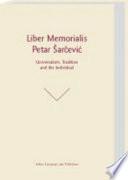
Liber Memorialis Petar Šarčević
Autore: Johan Erauw , Vesna Tomljenović , Paul Volken
Numero di pagine: 663This vast collection of scholarly writings examines a wide range of legal topics, including for example: European Private International Law of Obligations and Internal Market Legislation: A Matter of Coordination -- Balancing Sovereignty and Party Autonomy in Private International Law -- Parenthood for Same-Sex Couples: Challenges of Private International Law from a Scandinavian Perspective -- The Use of Unpublished Opinions on Relocation Law by the California Courts of Appeal: Hiding the Evidence? -- Spousal Support after Divorce under American Family Law: An Attempt to Contribute to the Alimony Debate -- Working with Children: The Balance between the Protection of Children and the Right to Work with Children -- Changing Parenthood after Divorce -- The Contribution of the UNCITRAL Arbitration Rules to International Commercial Arbitration -- Universalism and Tradition: The Use of Non-binding Principles in International Commercial Law -- Problems in the Implementation of WTO Law in the People's Republic of China -- Notes on the Pellegrini Judgment of the European Court of Human Rights -- Professional Traditions: The Reciprocating Ethics of Jurist and Judge
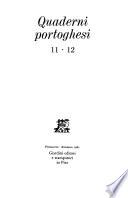
Quaderni portoghesi
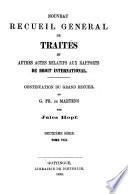
Nouveau recueil général de traités et autres actes relatifs aux rapports de droit international
Autore: Georg Friedrich Martens
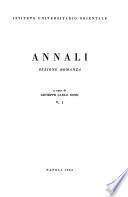
Annali
Autore: Istituto universitario orientale (Naples, Italy). Sezione romanza
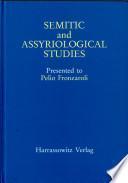
Semitic and Assyriological Studies
Autore: Pelio Fronzaroli
Numero di pagine: 697This substantial volume comprises almost fifty Semitic and Assyrological studies dedicated to Pelio Fronzaroli, professor of Semitic philology at the University of Florence, written by colleagues and pupils.
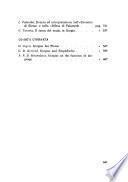
Siculorum gymnasium
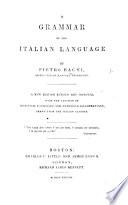
A Grammar of the Italian language ... A new edition revised and improved, etc
Autore: Pietro BACHI
Numero di pagine: 568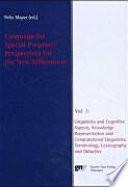
Language for Special Purposes
Autore: Felix Mayer
Numero di pagine: 887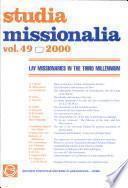
Lay Missionaries in the Third Millennium
Numero di pagine: 399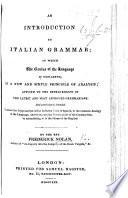
An Introduction to Italian Grammar
Autore: Frederick Nolan
Numero di pagine: 56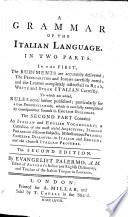
A grammar of the Italian language. In two parts ... The second edition
Autore: Evangelista PALERMO
Numero di pagine: 400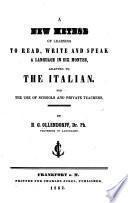
A New Method of Learning to Read, Write and Speak a Language in Six Months, Adapted to the Italian ...
Autore: Heinrich Gottfried Ollendorff
Numero di pagine: 549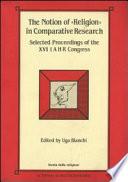
The Notion of "religion" in Comparative Research
Autore: International Association for the History of Religions. Congress , International Association for the History of Religions
Numero di pagine: 921Nel 1990 si tenne a Roma il XVI Congresso del I.A.H.R. che ebbe come tema la nozione di "religione". Venne particolarmente analizzato l'uso di tale termine da parte degli studiosi di lingua europea nei rapporti con le culture non europee e viceversa.
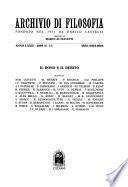
Archivio di filosofia
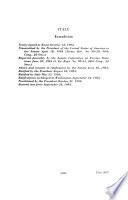
Extradition, Treaty Between the United States of America and Italy Signed at Rome October 13, 1983
Autore: Italy
Numero di pagine: 38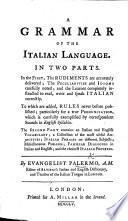
Grammar of the Italian Language, etc
Autore: Evangelista PALERMO
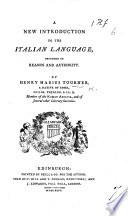
A new Introduction to the Italian Language
Autore: Enrico Mario TOURNER
Numero di pagine: 80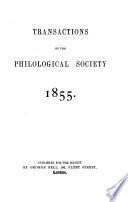
Bullettino della Commissione archeologica municipale
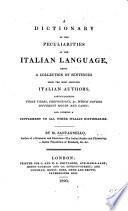
A Dictionary of the peculiarities of the Italian language, being a collection of sentences from ... Italian authors, etc
Autore: M. SANTAGNELLO
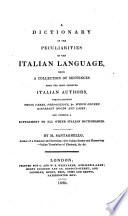
A dictionary of the peculiarities of the Italian language, being a collection of sentences from the most approved Italian authors
Autore: M. Santagnello
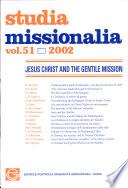
Jesus Christ and the Gentile Mission
Numero di pagine: 395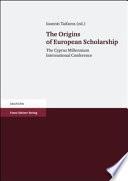
The Origins of European Scholarship
Autore: Iōannēs G. Taiphakos
Numero di pagine: 206Contents Ioannis Taifacos: Preface Pierre Swiggers / Alfons Wouters: L'�laboration de la grammaire comme discipline �technique� Stephanos Matthaios: Das Wortartensystem der Alexandriner. Skizze seiner Entwicklungsgeschichte und Nachwirkung Christos Nifadopoulos: Herodian on the nature of �linguistic pathos� Michael von Albrecht: Latin Literature and Roman Scholarship Wolfram Ax: Zur de voce-Definition der r�mischen Grammatik. Eine Antwort auf Wilfried Stroh Henry David Jocelyn: The Text of Plautus, Pseud. 817-18 and the Grammarians Flavius Caper and C. Iulius Romanus Giuseppina Barabino: L'auctoritas di Plauto in Nonio Marcello Javier Ur�a Varela: What can we learn from place-names in Charisius' �Ars grammatica'? Louis Holtz: Prol�gom�nes � une �dition critique du commentaire de Pomp�e, grammairien africain Mariarosaria Pugliarello: Lingua scritta e lingua parlata nel trattato di Martirio De b muta et v vocali Bengt L�fstedt: Nochmals zum Latein des Virgilius Maro Grammaticus Jacqueline Hamesse: Les glossaires bilingues, instruments de travail des traducteurs m�di�vaux William O. Duba: Aristotelian Traditions in Franciscan Thought: Matter and...
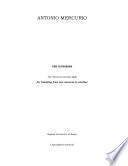
The Ulysseans. The Theorem and the Myth for Travelling from One Universe to Another
Autore: Antonio Mercurio
Numero di pagine: 171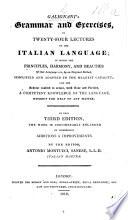
Galignani's Grammar and exercises in twenty four lectures on the Italian language ... In this third edition the work is considerably enlarged ... by the editor A. Montucci
Autore: J. A. GALIGNANI
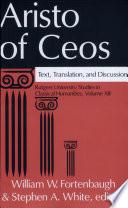
Aristo of Ceos
Autore: Ariston
Numero di pagine: 373Volume 13 in the RUSCH series continues work already begun on the School of Aristotle. Volume 9 featured Demetrius of Phalerum, Volume 10, Dicaearchus of Messana, Volume 11, Eudemus of Rhodes, and Volume 12, both Lyco of Troas and Hieronymus of Rhodes. Now Volume 13 turns our attention to Aristo of Iulis on Ceos, who was active in the last quarter of the third century BCE. Almost certainly he was Lyco's successor as head of the Peripatetic School. In antiquity, Aristo was confused with the like-named Stoic philosopher from Chios, so that several works were claimed for both philosophers. Among these disputed works, those with Peripatetic antecedents, like Exhortations and Erotic Dissertations, are plausibly assigned to Aristo of Ceos. Other works attributed to the Peripatetic are Lyco (presumably a biography of Aristo's predecessor), On Old Age, and Relieving Arrogance. Whether part of the last-named work or a separate treatise, Aristo's descriptions of persons exhibiting inconsiderateness, self-will, and other unattractive traits relate closely to the Characters of Theophrastus. In addition, Aristo wrote biographies of Heraclitus, Socrates, and Epicurus. We may be sure that he did ...
Vedi maggiori dettagli